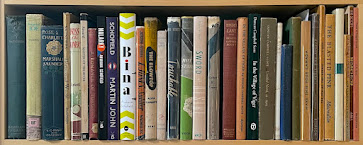New York: Arco, 1952
As far as I can tell, "Fort Crime!" is the first Alvin Schwartz story I ever read. It concerns a criminal organization that uses heavy artillery in committing crimes. Superman, Batman, and Robin figure.
Sword of Desire is not for children. It opens on the meeting of a senate committee looking into a "white slave" syndicate. The most recent witness, a woman who wore a clinging black silk dress and "gracile lizard skin pumps" – much is made of this – has been found naked and dead in a vacant lot. Senator Kingarden, who heads the committee, has had enough:
"Let's stop acting like a collection of sanctimonious old women poking Puritanically around the outer edges of wickedness. Let's be realistic and recognize that you don't investigate a crime by turning up your noses at the smell. If it's our business to legislate, then we can't afford to be so refined that we regard our noses as mere facial ornamentation. We've got, if I may say so, a genuine stink on our hands and the sooner we use the natural organs that God gave us for dealing with it, the sooner we'll get results."Tough talk, though it is clear that Kingarden has no intention of bringing fellow senators' noses or other organs an inch closer than need be. Instead, he proposes that psychoanalyst Dr Genorius Veresi be brought in to help with the investigation by going undercover as a john. There is some pushback from committee members, though not nearly so much as one might expect.
It's not what you think, nor is it wear you think. In the first case, Veresi grazes the underside of a patient's wrist.
Consider it a superpower. The doctor uses it to induce women in the syndicate to reveal all.
There were many points at which I nearly gave up on this novel. The whole thing seemed so silly and, to be completely honest, the sex scenes were mild in the extreme. Still, I'm glad I made the effort.
I will say that after "Contact Two" things really begin to pick up, even for those who know little of Reichian theory. It's here that Sword of Desire becomes a true detective story.
Sword of Desire was read for the 1952 Club, co-hosted by Kaggsy and Simon. Other books from 1952 I've read and reviewed here over the years include:
Of these, the one I most recommend is Vanish in an Instant, which is one of my very favourite Margaret Millar novels. She wrote so many!
I would be remiss in not also praising Murder Over Dorval by the mysterious David Montrose (Charles Ross Graham), which I helped return to print as part of the Véhicule Press Ricochet Books series. Coincidentally, I'm now involved in reissuing another of the titles listed above.
Object: A red hardcover wrapped in a jacket with uncredited illustration. The novel itself is followed by several pages of Arco promo material, six of which flog "ARCO SOPHISTICATES." The first title listed is Touchable, Schwartz's 1951 Arco collaboration with Lee Scott. It's the first Alvin Schwartz novel I ever read.
Access: Published once, then never again, McMaster and the University of Toronto have it in their holdings.
I purchased my copy two years ago as part of a lot of twelve Arco books. There were only two I wanted, the other being Alvin Schwartz's Man Maid (New York: Arco, 1952), but the price was right at an even US$100. At the time, two copies of Sword of Desire were listed online, the cheaper being US$100!
Never mind! As I write this, just one copy of Sword of Desire is listed for sale online. The price is a mere seven quid! Get it while you can!






















































